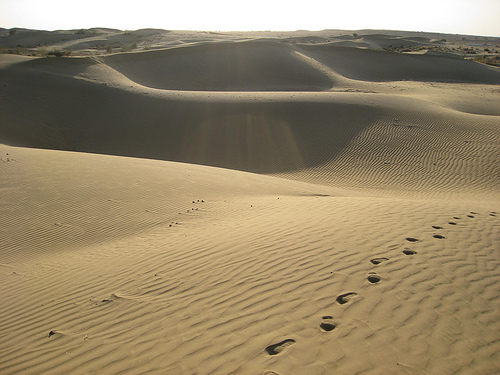Renewable energy can have adverse environmental effects too

Renewable energy requires massive installations, usually in remote or desert areas, of wind and solar farms. Such projects often spread over thousands of acres and invariably will have at least some adverse environmental impact. Deserts are fragile places. Ecosystems can be easily upset. Species like the desert tortoise are threatened by such developments. Plus, Native Americans often consider such lands important, if not sacred, to them.
Construction of gigantic wind and solar power plants is enormously disruptive to the habitat, as endless convoys of large trucks ferry equipment and supplies into the area. Wind power has additional problems, with some objecting to the constant noise. Plus, the turbines can be hazardous to birds.
California has several huge solar projects planned for deserts. Native American groups are trying to block or change them, saying they weren't properly consulted and are concerned that geoglyphs could be destroyed. Yet the reaction of many mainstream environmentalists is to brush such criticism aside. Johanna Wald of the National Defense Resource Counsel (NDRC) says "There's no free lunch when it comes to meeting our energy needs. To get energy, we need to do things that will have impacts." Yet the NDRC is steadfastly opposed to building new coal, gas, or nuclear plants, often because of the very same environmental impact concerns.
Kenneth Zweibel, director of the George Washington University Solar Institute, agrees with Wald's decidedly environmentally-unfriendly sentiment saying:
"Something you are trying to protect is being changed, but it's helping so much in terms of climate change, energy self-sufficiency and clean energy; it's a sacrifice that's appropriate to take."
Ah, but he's not the one making the sacrifice, is he? "We all have the strength to bear the misfortunes of others" especially when, in the parlance of Wall Street, one is talking their own book (praising stocks they own).
"The irony is, in the name of saving the planet; we're casting aside 30 or 40 years of environmental law. It's really a type of frenzy" says a solar analyst at an investment bank. This is made even more ironic because mainstream environmental groups are the ones pushing to ignore the environmental laws while an investment bank has become concerned. While the result of big wind and solar is renewable energy, this does not mean that safeguards should be ignored in a mad rush to go to clean energy.
One of the stalwarts of renewable energy for decades has been hydropower. Once constructed, big hydro projects have generally been considered to be environmentally friendly (The actual construction of course has serious environmental impact.) Yet it is becoming clear that big hydro has major adverse impacts after construction, and this is something no one predicted. At both the immense Guri dam in Venezuela and at the even larger Three Gorges dam in China, it is now clear that these dams have changed the weather, creating droughts. This means far less power is created than originally estimated. The dams also cause massive landslides and even earthquakes.
Yes, we need renewable energy and lots of it. But in the rush to install solar and wind on tens of thousands of acres of California desert, no one seems to be thinking about the long-term aggregate effect of such projects. No one thought big hydro would change the weather, but it does.
Will these projects have unforeseen effects in California deserts too?




